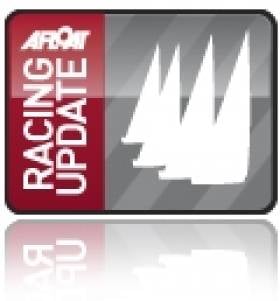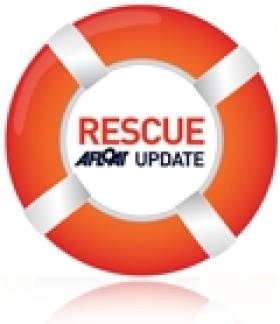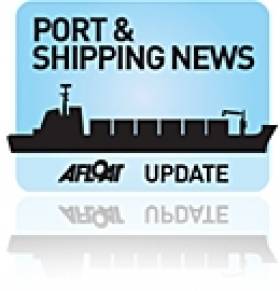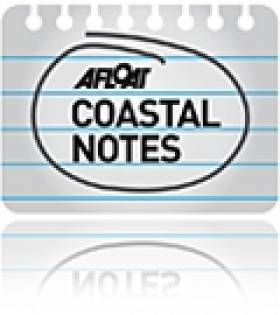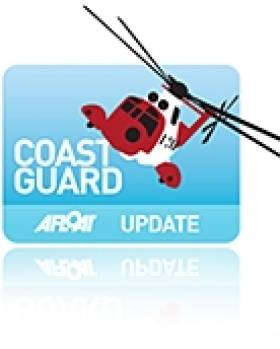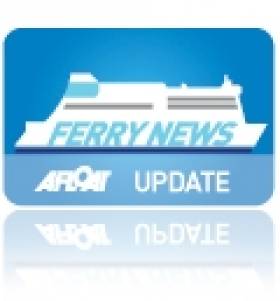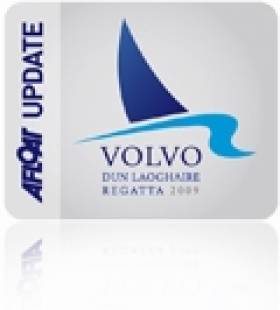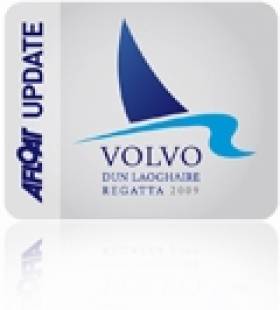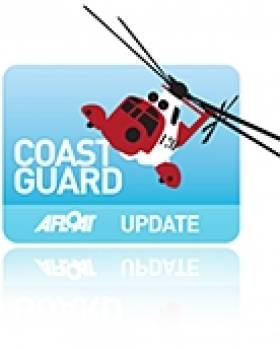Displaying items by tag: Clyde
Ailsa Craig Race Celebrates 50th Anniversary
#RACING UPDATE - This summer the Royal Ulster Yacht Club will stage the 50th anniversary edition of the Ailsa Craig Race, one of the classics of the Northern Ireland offshore yacht racing calendar.
Many of the competitors from the inaugural race in 1962 - several of whom are now in their 80s - are expected to compete in the overnight challenge, which takes the fleet from Bangor to the rock at the mouth of the Clyde in Scotland.
The 2012 Ailsa Craig Race, sponsored by Hamilton Shipping, takes place on 15 June.
Donegal Skipper's Dramatic Alaska Rescue Story
#RESCUE - A Donegal-born skipper joined in the dramatic rescue of a fishing trawler crew in Alaska recently, the Donegal Democrat reports.
Seamus Hayden Jr, who captains the fishing vessel Clyde, was berthed in Lazy Bay at the southern end of the Kodiak peninsula when he responded to a call from fellow vessel the Tuxedni to assist the stricken Heritage, which was sinking a mile east of nearby Tanner Head.
“I rousted my crew and fired our main engine to join the Tuxedni in the search," he said. "I did not know at that time if the Heritage crew had abandoned ship.
“I informed everyone onboard my vessel to dress for extreme weather and to use utmost caution and a buddy system at all times around the vessel."
Visibility was low due to ice fog and the darkness of the Alaskan winter nights, and as they got closer to the Heritage's location - where the US Coast Guard was attemping a helicopter rescue - conditions were "horrendous", with ice-cold winds of 60 knots.
I was very worried for the safety of all involved, including our own," said Hayden.
The Donegal Democrat has much more on the story HERE.
Ship Starring in BBC ‘The Box’ Departs Dublin Port
#PORTS & SHIPPING- Vega Stockholm, a vessel which featured in the BBC The 'Box' that tracked the movements of a single container around the world in 2008, coinciding with the start of the credit crunch crisis and telling the story of globalisation and the world economy, departed Dublin Port this evening, writes Jehan Ashmore.
The Box travelled the world ( totalling 50,000 miles) first departed from the BBC TV Centre headquarters, London and headed northwards by road to Scotland. From there the Box was loaded on board the Vega Stockholm in Greenock and she departed on 12th September (see PHOTO) and made an en route call to Belfast before arriving the next day in Dublin Port. Only 16 days later the fateful decision by the Irish Government to bail-out the Irish banks was made with a state guarantee.
The domestic economic crisis was also set against some of the most dramatic developments in the global economy including the first global recession in 60 years, notably with the fall of global finances giant Lehman Brothers.
The container box or forty equivalent units or (FEU) in industry parlance was painted in distinctive red and emblazoned with the words BBC News and the website www.bbc.co.uk/thebox so it could be tracked online across continents and oceans in addition to coverage by T.V. and radio. To trace the route taken by Box over 421 days to and from the UK, click HERE. In addition for further photographs taken by viewers following the Box departing the Clyde on board the container vessel click HERE.
On the first leg of a worldwide journey, Vega Stockholm (2006/8,306grt) departed the Scottish port with the Box laden with 15,000 bottles of Scotch whiskey bound for Shanghai, though this particular 'feeder' vessel would of carried the box to another port prior to onward shipment to the Far East by a much larger containership.
The Box carried other cargoes on different legs as part of its worldwide journey to include 4000 shoes and over 95,000 tins of cat food for our fluffy friends. Of the entire journey, over 47,000 miles was spent crossing the oceans.
The box itself suffered some battering along the way including that of an economic front as the container sat still for three months in the docks of the Japanese port of Yukohoma.
At the time a record 10% of the fleet were idle, and revenues per container were likely to have dropped from already extremely depressed levels. The journey of the Box made for an interesting time to be following a container around the world.
To put some figures into context during the exercise the global container business made a collective profit of £3bn in 2008, but is estimated to have lost a cool £20bn in 2009.
After the Box arrived back to Southampton with vehicle parts, the container finally returned to London. Perhaps the most ironic tale of the exercise was the actual fate of the 'Box' itself, as it was reported the container ended up in South Africa to be converted for use as soup kitchen, another story for the Beeb!
- Ports and Shipping
- Dublin Port
- BBC The Box
- Vega Stockholm
- Containerships
- Global economy
- Lehman Brothers
- Irish bank bailout
- Irish state bank guarantee
- BBC headquarters
- Port of Greenock
- Container feeder services
- Port of Shanghai
- Scotch Whiskey
- Yukohoma
- Credit crunch crisis
- Southampton Docks
- BBC News
- Clyde
- Port of Belfast
New Firth of Clyde Pilot Extends to NI Coast
#CLYDE – The first of the Clyde Cruising Club's Sailing Directions to be published under the Imray imprint is the 148 page Firth of Clyde book. The book is in fact the merger of Martin Lawrence's Yachtsman's Pilot series with the Clyde Cruising club's sailing and directions and anchorages. Whilst the familiar CCC format has been left unchanged, this major new edition incorporates material from Lawrence's Yachtsman's Pilot series. With redrawn plans, new ground level and aerial photographs, and a completely updated text this new edition offers the Clyde yachtsmen the best pilotage that is available.
Firth of Clyde extends beyond its titled area to the coast of Northern Ireland (Rathlin Island to Belfast Lough) and on the Scottish side southwards from Stranraer to Portpatrick and beyond to the Solway Firth and Cumbria.
NI First Minister Highlights Need for Local Knowledge Over Clyde Coastguard Closure Threat
#COASTGUARD - Northern Ireland's First Minister has highlighted the need for local knowledge in light of the threatened closure of the Clyde coastguard station in Scotland.
As previously reported by Afloat.ie, the control centre at Greenock is set to be scrapped under the UK government's plans to streamline Britain's coastguard network.
Some 31 jobs will be lost in the closure, while rescues on the River Clyde and western Scotland will in future be handled from Northern Ireland's Bangor station on Belfast Lough - which itself was saved from the chop following a review over the summer.
In a letter to MSP for West of Scotland, Stuart McMillan, First Minister Peter Robinson said that his and his government's concerns "centre on the safety of the people using our coasts and seaways, which could be jeopardised by the loss of local knowledge and experience."
McMillan welcomed his support, adding that "despite the consultation period being over, it is not too late for the UK Government listen to the growing number of voices saying that this must be reversed.
“Closing coastguard stations down including Clyde is a short-sighted and dangerous move which puts saving money over saving lives.”
Stranraer-Belfast Ferry Left Adrift Off Scottish Coast
The Press Association reports that the Stena Navigator was en route from Stranraer to Belfast when both of its engines broke down.
The ferry - carrying 70 passengers and 47 crew - was adrift some four nautical miles west of Corsewall Point lighthouse at the Mull of Galloway.
Clyde Coastguard confirmed that two Svitzer tugs, Norton Cross and Willowgarth, were dispatched to the vessel with the aim of towing it to Belfast, but the ferry managed to get one enging going and propelled itself at half power across the North Channel.
The Navigator arrived in port accompanied by the tugs around 4:30am. No injuries were reported in the incident.
Irish Sea Events Offer Entry Discounts
"The way this works is that the Clyde Cruising Club are offering a 25% rebate for boats from the 4 Dun Laoghaire Clubs (DMYC, NYC, RIYC, RStGYC) that enter the Brewin Dolphin Scottish series before the expiration of the early bird discount period which expires on April 22nd explained Dun Laoghaire event secretary, Ciara Dowling.
As a reciprocal arrangement the committee of the Volvo Dun Laoghaire Regatta are offering a discount of 50% from the full entry fee to all boats that enter both regattas. To avail of this, boats must register for the early bird entry fee in the Volvo Dun Laoghaire Regatta prior to 2 May 2011. Note the 50% discount will be applied to the full entry fee rate and not the early bird rate.
To avail of this arrangement for the Scottish Series contact the Brewin Dolphin Scottish Series office for details, [email protected] 0044141 221 2774.
To avail of this arrangement for the Volvo Dun Laoghaire regatta visit the event website at www.dlregatta.org or email [email protected]
The Scottish Series takes place from 27–30 May and the Dun Laoghaire regatta from July 7th–10th 2011.
In a further boost for Dun Laoghaire sailors heading north the feeder race from Bangor to Tarbert has been re-instated.
Troon and Largs Marinas are offering competitors berthing rate discounts around Scottish Series.
Competitors from Scotland coming to Dun Laoghaire are reminded that the entry fee to the regatta includes free berthing for the duration of the event.
The official Notice of Race and Online Entry are now available at www.dlregatta.org
Entries Roll in for Volvo Dun Laoghaire Regatta
Forty entries are already in for Volvo Dun Laoghaire Regatta, a fixture widely expected to be the biggest in Ireland this season when it sets sail on Dublin Bay in July.
Organisers are expecting up to 500 boats to keep it on a par with the 2009 event. The early entries, 11 weeks ahead of the entry deadline, is being taken as a thumbs up by competitors for the fun and vlaue theme of this year's VDLR.
So far 22 different clubs have entered from six countries. The bulk of the fleet is Irish but there are early entries from France, Isle of Man, UK, Wales and Northern Ireland. Another good turnout is exepcted from Liverpool and Holyhead for boats competing in the IRC Lyver Cup Race across the Irish Sea. Ten boats from the Clyde will also compete on the Bay.
Cork's Conor Phelan the skipper of Jump Juice is one of the first Royal Cork boats confirmed.
Two handed IRC racing makes its debut in July's Volvo Dun Laoghaire Regatta organisers have also confirmed. Click HERE.
On the dinghy front, the Fireball class has confirmed it will be running an'Open Championship' within the regatta, an event that follows the class world championships in Sligo in June.
Search Underway for Missing Ferry Passenger
The vessel had departed from Larne at 07.24 this morning and arrived at Cairnryan two hours later at a speed of approximately 18 knots. The master of the vessel has confirmed that one person is missing from the ships manifest.
The sea conditions are currently calm with a slight swell and good visibility with south westerly winds of 5 knots between the two locations.
A rescue helicopter, R 177, has been scrambled from the Royal Naval Air Station at Prestwick.
Clyde Coastguard are now organising a search throughout the area taking into account tidal drift and winds. Coastguard Rescue Teams have now been turned out ready to search the shores of Loch Ryan.
The Portpatrick, Stranraer and Larne RNLI lifeboats have all been requested to launch. A search has also begun from Cairnryan to Finnarts Bay. The Police Service of Northern Ireland has also been informed.
A mayday signal has now also been broadcast into the area by the Coastguard to alert passing shipping to the unfolding incident.


























